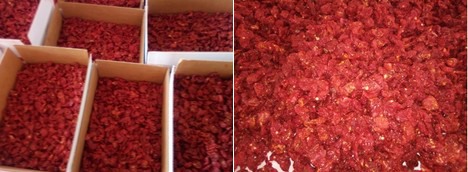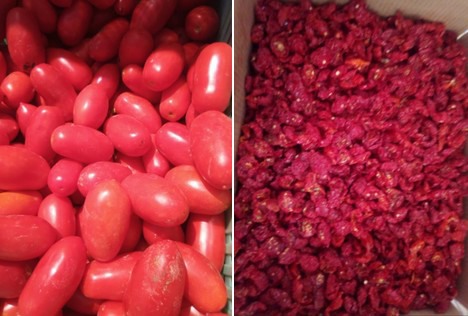Sun-dried tomatoes have always been known and loved in the Mediterranean region. In Tunisia, too, these delicacies from local production are an indispensable part of the kitchen. An ambitious support group has now set itself the goal of offering North African products on the German market. The cooperative has a total of 40 hectares of tomato cultivation area in the Kairouan region, but will primarily plant half of the area. "We harvest just over 2200 tons of tomatoes from twenty hectares. Most of the harvest is sold fresh (for the production of tomato concentrate) at the local market and from a smaller part of the harvest we currently produce only 30 to 40 tons of dried tomatoes," explains Jamel Jaballah, contact person for the project. "Our strategy is to look first at what the potential is on the German market. If everything goes according to plan, we will also grow the remaining half of the area under cultivation in the near future," Mr. Jaballah added.

In Tunisia, tomato production takes up around 18,000 hectares of cultivable land and is just over 1 million tonnes. A tenth of the total area is devoted to the production of sun-dried tomatoes. The majority of tomatoes usually reach the market between July and September. Jaballah: "The drying and packaging of the tomatoes is done locally in Tunisia. The finished, packaged product is then exported to Germany. In principle, we are open to all sales areas, whether wholesale, food retail or independent retailers."
Pomegranates as second mainstay
Parallel to the sun-dried tomatoes, pomegranates are also grown on about 1.5 hectares. Although the plantation is not necessarily located in the main pomegranate growing area, the conditions for cultivation are optimal, Jaballah knows. "Tunisian pomegranates are particularly robust, storable and hardly susceptible to pests."

The first pomegranates of this year's season are already available: "The harvest window is quite short and takes about 6-7 weeks. Due to the fruit's excellent shelf life, they are available until January, similar to pomegranates from other Mediterranean countries, such as Turkey, Morocco and Spain." For more information:Jamel Jaballah+49 176 32300909[email protected]